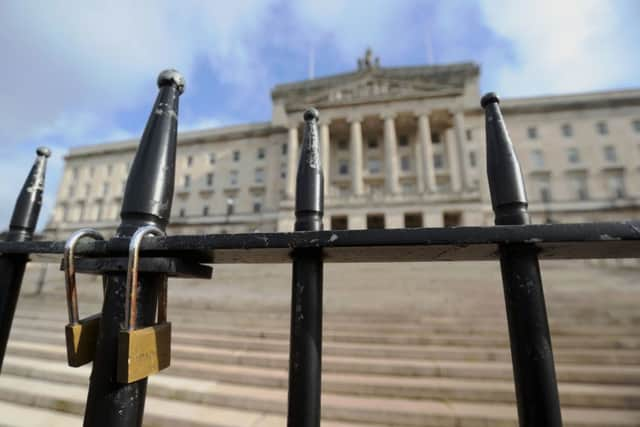Two years without a government: Time for Sinn Fein to end '˜boycott', says DUP man
and live on Freeview channel 276
Speaking on the second anniversary of the collapse of the devolved institutions at Stormont, East Antrim representative Gordon Lyons said it is vital that Northern Ireland has a functioning Executive and Assembly.
Accusing Sinn Fein of “boycotting” the institutions, Mr Lyons said: “Two years without a government is not the wish of the DUP.
Advertisement
Hide AdAdvertisement
Hide Ad“We believe in devolution. We want what is best for the people living here and that’s having a functioning Executive and Assembly.”


The DUP and Sinn Fein, former power-sharing partners at Stormont, have blamed each other for the impasse since deputy first minister Martin McGuinness stepped aside in January 2017.
Calling for an end to the current “political drift”, Sinn Fein negotiator Conor Murphy has warned that the Good Friday peace agreement, which paved the way for power-sharing, could become unsalvageable if the situation continues.
“It is imperative we arrest the political drift that we are currently in and stop the attempts to unravel the Good Friday Agreement and its political institutions before it becomes unsalvageable,” he commented.
Advertisement
Hide AdAdvertisement
Hide Ad“Public confidence must be earned and trust rebuilt if the Assembly and Executive is going to have any credibility.”
Northern Ireland’s two largest parties are fundamentally divided on key issues such as Brexit and calls for an Irish language act.
David Sterling, head of the Northern Ireland Civil Service, said that two years ago he would not have believed the hiatus could continue for so long.
“We are doing everything we can in the prevailing circumstances, continuing to work with partners across the public sector and wider society, but civil servants cannot take the place of ministers when it comes to strategic policy development or in taking transformative decisions that are urgently needed,” he said.
Advertisement
Hide AdAdvertisement
Hide Ad“We want to see the Executive restored as quickly as possible as there is a clear need for fresh thinking and renewed policy impetus in almost every area.”
Following legal delays, civil servants have been given the go-ahead to make major decisions.
They are still guided by ministerial decisions which are now two years out of date and in many cases important policy decisions lie in abeyance.
Ann McGregor, chief executive of Northern Ireland Chamber of Commerce and Industry, said recent research to be published by NI Chamber and BDO on Wednesday reveals that its members believe going into 2019 without an Executive is extremely damaging to economic prospects – with more than half predicting a negative impact on their own business.
Advertisement
Hide AdAdvertisement
Hide Ad“Firms are showing particular frustration around the damage caused to regional investment and local decision-making as well as the fact that Northern Ireland has no political voice in the UK/EU negotiations,” she added.